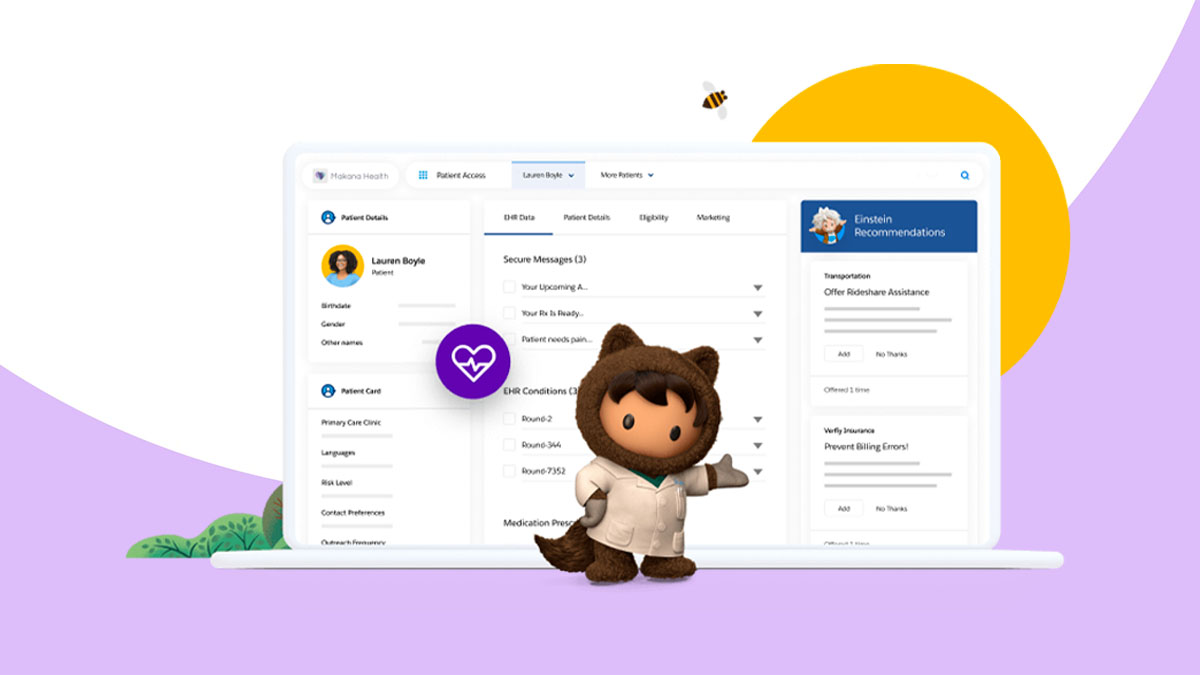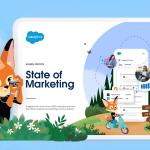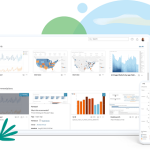The medical device (MedDev) manufacturing industry is forecast to grow by 5.6% by 2024, and medical technology (MedTech) – technology-enabled medical devices – is where the market is heading. As average life expectancy grows, ageing populations are driving demand. The elderly already account for a third of the total healthcare spend across the world. But the need to speed up and scale up services must be balanced with the rise of value-based care and an increased focus on patient outcomes.
Does Salesforce offer a CRM for MedTech?
The MedTech ecosystem can be complicated. It’s a heavily regulated industry, devices need to be approved by the relevant bodies before they can go to market. Firms then must convince healthcare providers to use their products and recommend them to patients. Providers may need to be reimbursed for purchases, or hire equipment on a subscription model, and it’s up to MedTech companies to provide support every step of the way.
In short, there are a lot of moving parts, and you may be considering which CRM is best to keep operating costs down and build stronger relationships with providers. Salesforce breaks down silos, supports collaboration, and enables deeper connections with patients, providers, and partners. Health Cloud combines the best of Salesforce with industry-specific knowledge to support the unique challenges faced by MedDev manufacturers while enabling them to inject intelligence throughout the provider lifecycle and reduce costs.
Deliver the experience that clinicians and patients deserve
The healthcare landscape is transforming in response to new consumer expectations, and the most successful companies are the ones embracing value-based care.

How the MedTech landscape is changing
There are four key disruptors in the MedTech industry, and how companies navigate these will determine their future success.
- Data-driven commercial operations. MedTech organisations are becoming more digitised and capturing more data than ever, with 67% of experts agreeing that data storage and integration will be a key service in the future. How organisations harness the power of data can drive improvements across commercial operations, impact how they engage with the customer, and provide more timely, relevant recommendations around pricing, products, and services.
- New hybrid engagement. MedTech has always been an in-person industry, but we’ve seen a dramatic shift towards virtual engagements between HCPs (Healthcare Professionals) and Sales reps since the pandemic. With 60% of surgeons expecting in-person restrictions to continue, new ways of working are becoming the norm.
- Addressing the entire patient journey. Rather than focusing on treatment, the industry is now taking a more holistic approach to include prevention, wellness, diagnosis, and detection; with 46% of MedTech start-ups focusing on these areas. This is indicative of the broader movement towards patient-centricity and providing products and services that support the entire patient journey.
- The growing technology gap. While data and technology are playing an increasingly important role for MedTechs, 88% of executives feel keeping up with advances in technology is a challenge. How organisations embrace technology and apply it in practice will be a strong indicator of future success.
Addressing the most pressing challenges and promising opportunities:
Let’s look at how Salesforce enables MedTech companies to elevate provider relationship management.
Creating a centralised commercial operations platform
While many MedTech companies recognise that improving commercial operations can drive growth and profit, they need to take into account the changing expectations of B2B buyers. Such as flexible product offers and multiple payment options. Buyers want to browse online product catalogues, click to request a quote, and have access to support if they need guidance. Give them a frictionless buying experience, and they’re twice as likely to become a loyal customer.
An effective commercial operations platform is made up of a front-end CRM, middle office functionality (such as revenue management, quotes, sales contracts, etc.) and analytics, all integrated with the ERP system. Salesforce delivers middle-office solutions to bring greater sales and operational efficiency, keeping the customer front and centre throughout the entire lifecycle. According to IDC Health Insights, revenue leakage is a significant worry for MedTech companies, and 4.4% of sales are lost this way. Inefficient contract management can also cost a business up to 9.2% of its annual revenue. Centralising contract lifecycle management and leveraging automation can eliminate both of these issues.
Another transformation we’re seeing involves data. With a single data repository and Tableau analytics, companies can identify where they’re losing money and which processes need to be improved to achieve better business outcomes. In short, it aggregates data from multiple sources and makes it actionable. Unlocking a holistic view of data can be transformational – take rebate management, for example. Studies reveal that one-third of MedTech companies overpay on incentives by an average of 10% on incentive rebates and 5% on distributor rebates. Delays in settling payments aren’t just frustrating, they risk eroding trust with partners. Half of all MedTech companies are unsatisfied with their current systems, but it doesn’t have to be this way. The Salesforce platform can be optimised to meet the unique challenges that MedTech companies are facing.
Streamlining virtual sales for MedTech
Virtual sales were crucial to ensuring companies could operate during the pandemic, and hybrid working is here to stay. One use case for virtual sales is to help reps sell multiple devices at once rather than visiting surgeons each time they perform a procedure. Salesforce enables reps to schedule virtual meetings with the right stakeholders to discuss new opportunities, with full visibility of the provider history to keep conversations relevant. This kicks off an automated workflow that guides them through every step of the process, from prompts to update case notes and check inventory levels, to dashboards with intelligent insights to provide more value to the clinician.
When an order is placed, the clinician is sent training materials on how to use and store the device before it’s even dispatched. If the team is preparing for a specific procedure, they can access more information about best practices to make sure they’re well prepared to give the patient the highest possible standard of care.
Of course, the provider relationship isn’t limited to individual sales. The clinician will also be notified of new products, webinars, or training they might be interested in, and can use a scheduling tool to book a meeting if they have any questions. While virtual selling is designed to be seamless from anywhere, if the doctor prefers to meet in person, all parties receive the same great experience whether they’re working from a mobile device, remotely, or in the office.
Smarter field inventory management
Many sales reps feel they’re spending too much time on inventory management instead of what matters most – selling. Salesforce provides a single, integrated mobile platform to optimise inventory visibility and management. This means reps are more productive and there’s no expired, lost, or wasted inventory to worry about. Better visibility also means individual sales reps can swap inventory to ensure no procedure is ever missed because the surgeon didn’t have the right equipment.
Contract lifecycle management also helps to simplify rentals. Samples, trial, and loaner stock is all managed as consignment inventory, and an automated workflow handles approvals, reservation, and shipments, and generates contracts that can be signed digitally. Artificial intelligence proactively guides reps with suggested actions at every stage to enable them to work smarter and faster. Recall, replenishment, returns, and repair management are also handled in one platform, with push notifications making life easier for both healthcare practitioners and reps. The bottom line? Higher revenues, bigger operating margins, and better cash flow.
Optimising the MedTech contact centre
The MedTech contact centre empowers healthcare providers with omnichannel support. Salesforce provides a central, personalised hub with a consumer-like look and feel. Providers can log in to find relevant articles about new products, browse social feeds, and access their order history, invoices, and training materials, all in one place. Artificial intelligence helps buying managers get the most from their budget – dashboards show how well they’re using their current contracts, when promotions are running for specific products they’re considering, and what discounts are available. To speak to a sales rep, they can simply use @ tagging for a prompt response.
The hub also makes it easy to open cases if, for example, an order arrives damaged. When they submit their case, the provider can mark the level of urgency and add notes, and by clicking on the relevant product in their order history, the rest of the form will be pre-populated to save them re-entering information. Premier accounts also have the option to resolve their issue faster with Live Chat, which routes the case to the most relevant free agent. As the service team collaborates on resolving the issue, all parties are kept informed with notifications at every step. When the case closes, the provider can fill in a customer satisfaction survey to help the MedTech company identify opportunities to improve service.
Health Cloud for MedTech
By helping MedTech companies manage partner relationships with a single, scalable platform, Salesforce helps companies stand apart from the competition, comply with industry regulations, and create their own partner and patient communities. The platform is easy to integrate and connect with other systems, which also makes it easier to build apps and custom capabilities to truly align partner relationship management with the unique challenges of the business.
If MedTech is the future, Health Cloud is the platform to help manufacturers adapt, evolve, and better serve healthcare providers.
Take data further for smarter relationships
Equip your team with 360-degree views that help connect and engage every patient, member, employee, and partner.

























